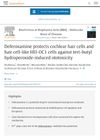TLDR N-acetylcysteine may help treat uterine and placental issues in PCOS.
The study investigated the effects of N-acetylcysteine (NAC) on uterine and placental ferroptosis in a rat model of polycystic ovary syndrome (PCOS). NAC was found to effectively suppress ferroptosis, a type of cell death linked to oxidative stress, in the uterine and placental tissues of the rats. The research involved 42 pregnant rats and demonstrated that NAC could potentially serve as a therapeutic agent for managing reproductive complications associated with PCOS by reducing oxidative stress and preventing cell death in critical reproductive tissues. However, NAC did not fully reverse mitochondrial abnormalities in the uterus, though it partially did so in the placenta. The study highlighted NAC's potential to mitigate HAIR-induced uterine and placental dysfunction in PCOS, though clinical validation is needed.
104 citations
,
June 2020 in “Journal of Endocrinology” Hyperandrogenism and insulin resistance in PCOS-like rats can lead to pregnancy complications due to increased cell death in the uterus and placenta.
 883 citations
,
August 2016 in “Nature Reviews Disease Primers”
883 citations
,
August 2016 in “Nature Reviews Disease Primers” Polycystic Ovary Syndrome (PCOS) is a common condition in women that can cause metabolic, reproductive, and psychological issues, and requires lifestyle changes and medication for management.
 414 citations
,
August 2005 in “The Journal of Clinical Endocrinology and Metabolism”
414 citations
,
August 2005 in “The Journal of Clinical Endocrinology and Metabolism” Polycystic ovary syndrome costs the U.S. over $4 billion a year, mainly from treating related health issues.
 1 citations
,
July 2023 in “Frontiers in Immunology”
1 citations
,
July 2023 in “Frontiers in Immunology” Oxidative stress and immune dysfunction are linked to both Hashimoto's thyroiditis and polycystic ovary syndrome, with diet and specific treatments important for managing these conditions.
 March 2024 in “Biochimica et biophysica acta. Molecular basis of disease”
March 2024 in “Biochimica et biophysica acta. Molecular basis of disease” Deferoxamine may help protect inner ear cells from damage caused by oxidative stress.
 8 citations
,
October 2023 in “Folia Histochemica et Cytobiologica”
8 citations
,
October 2023 in “Folia Histochemica et Cytobiologica” Exosomes from modified stem cells may help treat liver injury.
2 citations
,
February 2023 in “International journal of molecular sciences” Tetrathiomolybdate reduces hair growth marker in skin cells by boosting harmful oxygen molecules, but effects can be reversed.
 31 citations
,
August 2021 in “Stem Cell Research & Therapy”
31 citations
,
August 2021 in “Stem Cell Research & Therapy” The conclusion is that understanding how hair follicle stem cells live or die is important for maintaining healthy tissue and repairing injuries, and could help treat hair loss, but there are still challenges to overcome.





